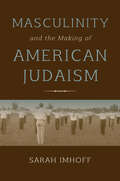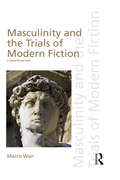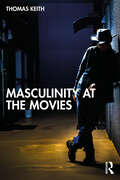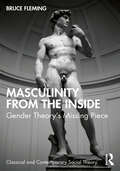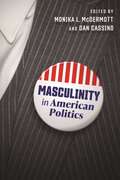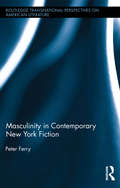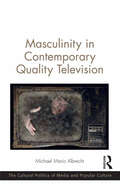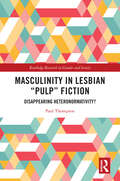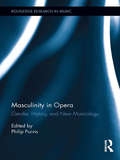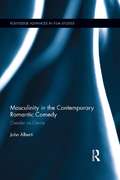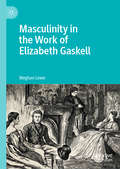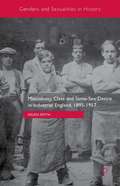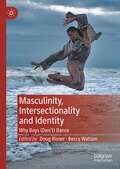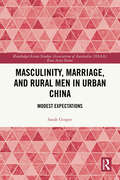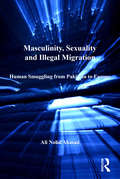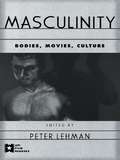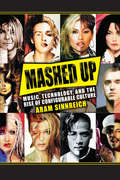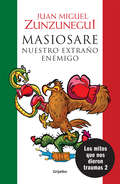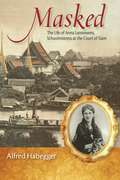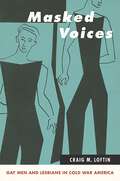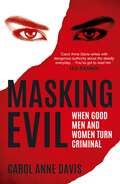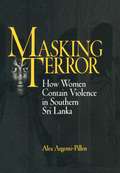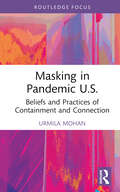- Table View
- List View
Masculinity and the Making of American Judaism
by Sarah ImhoffAn examination of how early twentieth-century American Jewish men experienced manhood and presented their masculinity to others.How did American Jewish men experience manhood, and how did they present their masculinity to others? In this distinctive book, Sarah Imhoff shows that the project of shaping American Jewish manhood was not just one of assimilation or exclusion. Jewish manhood was neither a mirror of normative American manhood nor its negative, effeminate opposite. Imhoff demonstrates how early twentieth-century Jews constructed a gentler, less aggressive manhood, drawn partly from the American pioneer spirit and immigration experience, but also from Hollywood and the YMCA, which required intense cultivation of a muscled male physique. She contends that these models helped Jews articulate the value of an acculturated American Judaism. Tapping into a rich historical literature to reveal how Jews looked at masculinity differently than Protestants or other religious groups, Imhoff illuminates the particular experience of American Jewish men.“There is so much literature—and very good scholarship—on Judaism and gender, but the majority of that literature reflects an interest in women. A hearty thank you to Sarah Imhoff for writing the other half of the story and for doing it so elegantly.” —Claire Elise Katz, author of Levinas and the Crisis of Humanism“Invariably lucid and engaging, Sarah Imhoff provides a secure foundation for how religion shaped American masculinity and how masculinity shaped American Judaism in the early twentieth century.” —Judith Gerson, author of By Thanksgiving We Were Americans: German Jewish Refugees and Holocaust Memory
Masculinity and the Trials of Modern Fiction
by Marco WanHow do lawyers, judges and jurors read novels? And what is at stake when literature and law confront each other in the courtroom? Nineteenth-century England and France are remembered for their active legal prosecution of literature, and this book examines the ways in which five novels were interpreted in the courtroom: Gustave Flaubert’s Madame Bovary, Paul Bonnetain’s Charlot s’amuse, Henry Vizetelly’s English translation of Émile Zola’s La Terre, Oscar Wilde’s The Picture of Dorian Gray and Radclyffe Hall’s The Well of Loneliness. It argues that each of these novels attracted legal censure because they presented figures of sexual dissidence – the androgyne, the onanist or masturbator, the patricide, the homosexual and the lesbian – that called into question an increasingly fragile normative, middleclass masculinity. Offering close readings of the novels themselves, and of legal material from the proceedings, such as the trial transcripts and judicial opinions, the book addresses both the doctrinal dimensions of Victorian obscenity and censorship, as well as the reading practices at work in the courtroom. It situates the cases in their historical context, and highlights how each trial constitutes a scene of reading – an encounter between literature and the law – through which different forms of masculinity were shaped, bolstered or challenged.
Masculinity at the Movies
by Thomas KeithMasculinity at the Movies takes a deep dive into masculinity in film and how Hollywood movies continue to produce and promote masculine stereotypes that place boys and men in constraining identities and dysfunctional patterns of behaviour.From classic film stars to those of the present day, this textbook unpacks the development of the main male stereotypes in film – villains, heroes, and oafs – and how movies can develop healthy new male representations. Alongside Hollywood studio productions, it delves into Black, Native American, Latino, and Asian representation as well as LGBTQ masculinity. Going beyond the present, it proposes what healthy masculinity at the movies looks like and where Hollywood should set its sights to create more progressive models of masculinity for the 21st century.Masculinity at the Movies will provide students of gender studies, media studies, and cultural studies with new insights into stereotypes of men in contemporary film.
Masculinity from the Inside: Gender Theory’s Missing Piece (Classical and Contemporary Social Theory)
by Bruce FlemingRejecting the vocabulary and presuppositions common in Western talk about men, this book considers the ways in which men see, speak about, and understand themselves. Based on the author’s experience of teaching young men at a military academy and drawing on a range of theory, it identifies a disconnect between academic discourses on “masculinity,” based as these are on theoretical positions that describe the world from a position of “outsidership,” and the reality of most men’s experience—or, the way in which men see themselves. With an erroneous view of men dominating the airwaves, most men simply fail to engage, leaving the mistaken conceptions of masculinity to circulate and allowing policies to develop that treat men as predators and aggressors. Presenting insights into masculinity drawn from experience with young men drawn toward military life, Masculinity from the Inside seeks to address the gulf between scholarly understandings of men and men’s own understandings of themselves. It will therefore appeal to scholars and students of sociology, cultural studies, and gender studies, to anyone with interests in contemporary masculinity and the question of what it means to be a man.
Masculinity in American Politics
by Dan Cassino Monika L. McDermottHow elements of masculinity manifest themselves in all aspects of American political lifeWhile hardly a new phenomenon, masculinity—which includes elements of toughness, independence, and leadership, among others—roared onto the national political stage in America with the 2016 candidacy, election, and presidency of Donald Trump. Research into masculinity dates back over a century, but little attention has been paid to the specific role of masculinity in politics beyond the conventional wisdom that it, rather than femininity, is the dominant force. This lack of research has led to a lack of knowledge on how exactly, and how much, masculinity shapes political structures, attitudes and behaviors, from children’s socialization to our masculine political world, to how a new generation views this traditional dominance.In Masculinity in American Politics, Monika L. McDermott and Dan Cassino bring together a prestigious group of interdisciplinary scholars to explore these questions and their implications for different aspects of political life. Topics include the challenge of defining and measuring masculinity, how perceptions of gender and masculinity can shape campaign messaging strategies and public opinion, and other discussions of political identity, including age, race, and ethnicity.With contributions from Melissa Deckman, Jill S. Greenlee, Amanda Bittner, and other high-profile scholars, this comprehensive volume provides insight into masculinity and its high-stakes political manifestations, particularly as Gen Z fights to redefine the contours of their own gender and sexuality. Drawing upon insights from politics, sociology, psychology, and the broader social sciences, Masculinity in American Politics pushes the field to look “beyond the binary” and illuminate this brave, new world of political conflict and possibility.
Masculinity in Contemporary New York Fiction (Routledge Transnational Perspectives on American Literature)
by Peter FerryMasculinity in Contemporary New York Fiction is an interdisciplinary study that presents masculinity as a key thematic concern in contemporary New York fiction. This study argues that New York authors do not simply depict masculinity as a social and historical construction but seek to challenge the archetypal ideals of masculinity by writing counter-hegemonic narratives. Gendering canonical New York writers, namely Paul Auster, Bret Easton Ellis, and Don DeLillo, illustrates how explorations of masculinity are tied into the principal themes that have defined the American novel from its very beginning. The themes that feature in this study include the role of the novel in American society; the individual and (urban) society; the journey from innocence to awareness (of masculinity); the archetypal image of the absent and/or patriarchal father; the impact of homosocial relations on the everyday performance of masculinity; male sexuality; and the male individual and globalization. What connects these contemporary New York writers is their employment of the one of the great figures in the history of literature: the flâneur. These authors take the flâneur from the shadows of the Manhattan streets and elevate this figure to the role of self-reflexive agent of male subjectivity through which they write counter-hegemonic narratives of masculinity. This book is an essential reference for those with an interest in gender studies and contemporary American fiction.
Masculinity in Contemporary Quality Television (The Cultural Politics of Media and Popular Culture)
by Michael Mario AlbrechtRecent years have seen a rise in the popularity and quantity of ’quality’ television programs, many of which featuring complicated versions of masculinity that are informed not only by the women’s movement of the sixties and seventies, but also by several decades of backlash and debate about the effects of women’s equality on men, masculinity, and the relationship between men and women. Drawing upon studies of contemporary television programs, including popular series viewed internationally such as Mad Men, The League, Hung, Breaking Bad, Louie, and Girls, this book explores the ways in which popular cultural texts address widely circulating discourses of the ostensible ’crisis of masculinity’ in contemporary culture. A rich study of masculinity and its representation in contemporary television, Masculinity in Contemporary Quality Television will appeal to scholars and students of cultural and media studies, popular culture, television studies and cultural sociology with interests in gender, masculinities, and sexuality.
Masculinity in Lesbian “Pulp” Fiction: Disappearing Heteronormativity? (Routledge Research in Gender and Society)
by Paul ThompsonThis book looks specifically and in depth, for the first time, at masculinity in cheap, lesbian-themed paperbacks of the two decades after WW2. It challenges established critical assumptions about the readership, and sets the masculinity imagined in these novels against the “masculinity crisis” of the era in which they were written.The key issue of these novels is couplehood as much as sexuality, and the instability of masculinity leads to the instability of the couple. Thompson coins the term “heteroemulative” to describe the struggle that both heterosexual and homosexual couples have in conforming to heteronormativity.As several of these novels have been republished and remain in print, they have taken on a new relevance to issues of sexuality and gender in the twentyfirst century, and this study will attract readers within that area of interest. A valuable read for sociologists studying gender roles, and social historians of the cold war period in the United States. It is suitable for readers of all academic levels, from undergraduate, through postgraduate, to scholars and researchers, but also for a general readership.
Masculinity in Opera (Routledge Research in Music #6)
by Philip PurvisThis book addresses the ways in which masculinity is negotiated, constructed, represented, and problematized within operatic music and practice. Although the consideration of masculine ontology and epistemology has pervaded cultural and sociological studies since the late 1980s, and masculinity has been the focus of recent if sporadic musicological discussion, the relationship between masculinity and opera has so far escaped detailed critical scrutiny. Operating from a position of sympathy with feminist and queer approaches and the phallocentric tendencies they identify, this study offers a unique perspective on the cultural relativism of opera by focusing on the male operatic subject. Anchored by musical analysis or close readings of musical discourse, the contributions take an interdisciplinary approach by also engaging with theatre, popular music, and cultural musicology scholarship. The various musical, theoretical, and socio-political trajectories of the essays are historically dispersed from seventeenth to twentieth- first-century operatic works and practices, visiting masculinity and the operatic voice, the complication or refusal of essentialist notions of masculinity, and the operatic representation of the ‘crisis’ of masculinity. This volume will not only enliven the study of masculinity in opera, but be an appealing contribution to music scholars interested in gender, history, and new musicology.
Masculinity in Transition
by K. Allison HammerLocating the roots of toxic masculinity and finding its displacement in unruly culture Masculinity in Transition analyzes shifting relationships to masculinity in canonical works of twentieth-century literature and film, as well as in twenty-first-century media, performance, and transgender poetics. Focusing on &“toxic masculinity,&” which has assumed new valence since 2016, K. Allison Hammer traces its roots to a complex set of ideologies embedded in the histories of settler colonialism, racial capitalism, and political fraternity, and finds that while toxic strains of masculinity are mainly associated with straight, white men, trans and queer masculinities can be implicated in these systems of power. Hammer argues, however, that these malignant forms of masculinity are not fixed and can be displaced by &“unruly alliances&”—texts and relationships that reject the nationalisms and gender politics of white male hegemony and perform an urgently needed reimagining of what it means to be masculine. Locating these unruly alliances in the writings, performances, and films of butch lesbians, gay men, cisgender femmes, and trans and nonbinary individuals, Masculinity in Transition works through an archive of works of performance art, trans poetics, Western films and streaming media, global creative responses to HIV/AIDS, and working-class and &“white trash&” fictions about labor and unionization. Masculinity in Transition moves the study of masculinity away from an overriding preoccupation with cisnormativity, whiteness, and heteronormativity, and toward a wider and more generative range of embodiments, identifications, and ideologies. Hammer&’s bold rethinking of masculinity and its potentially toxic effects lays bare the underlying fragility of normative masculinity. Retail e-book files for this title are screen-reader friendly with images accompanied by short alt text and/or extended descriptions.
Masculinity in the Contemporary Romantic Comedy: Gender as Genre (Routledge Advances in Film Studies #24)
by John AlbertiThis volume addresses the growing obsolescence of traditional constructions of masculine identity in popular romantic comedies by proposing an approach that combines gender and genre theory to examine the ongoing radical reconstruction of gender roles in these films. Alberti creates a unified theory of gender role change in the movies that combines the insights of both poststructuralist gender and narrative genre theory, avoiding binary approaches to the study of gender representation. He establishes the current "crises" in both gender representation and genre development within romantic comedies as examples of experimentation and change towards narratives that feature more egalitarian and less essentialist constructions of gender.
Masculinity in the Work of Elizabeth Gaskell
by Meghan LoweThis book is the first full-length study to focus on the representation of masculinity in Elizabeth Gaskell’s novels. In examining Gaskell’s understanding of masculine identity as a social construct and considering how her writing engages with Victorian ideologies of gender, this book demonstrates that Gaskell defies an essentialist approach to gender and instead explores masculinity over time, genre, region, and class, making it clear that masculinity is not monolithic but relational, culturally constructed, and dependent on many contexts. It analyses Gaskell’s depiction of what it means to be a ‘man’ and a ‘gentleman’, exploring Mary Barton, North and South, Ruth, Cousin Phillis, Sylvia’s Lovers, and Wives and Daughters, as well as contemporary Victorian works and key contexts such as sympathy, historic change, and industrialism. The target audiences are academics, as well as undergraduate and postgraduate students and research specialists, and it will most appeal to Victorian Literature, Gender Studies, and Masculinity Studies disciplines.
Masculinity, Class and Same-Sex Desire in Industrial England, 1895-1957 (Genders and Sexualities in History)
by Helen SmithMasculinity, Class and Same-Sex Desire in Industrial England, 1895-1957 explores the experiences of men who desired other men outside of the capital. In doing so, it offers a unique intervention into the history of sexuality but it also offers new ways to understand masculinity, working-class culture, regionality and work in the period.
Masculinity, Intersectionality and Identity: Why Boys (Don’t) Dance
by Beccy Watson Doug RisnerThis unparalleled collection, international and innovative in scope, analyzes the dynamic tensions between masculinity and dance. Introducing a lens of intersectionality, the book’s content examines why, despite burgeoning popular and contemporary representations of a normalization of dancing masculinities, some boys don’t dance and why many of those who do struggle to stay involved. Prominent themes of identity, masculinity, and intersectionality weave throughout the book’s conceptual frameworks of education and schooling, cultures, and identities in dance. Incorporating empirical studies, qualitative inquiry, and reflexive accounts, Doug Risner and Beccy Watson have assembled a unique volume of original chapters from established scholars and emerging voices to inform the future direction of interdisciplinary dance scholarship and dance education research. The book’s scope spans several related disciplines including gender studies, queer studies, cultural studies, performance studies, and sociology. The volume will appeal to dancers, educators, researchers, scholars, students, parents, and caregivers of boys who dance. Accessible at multiple levels, the content is relevant for undergraduate students across dance, dance education, and movement science, and graduate students forging new analysis of dance, pedagogy, gender theory, and teaching praxis.
Masculinity, Marriage and Rural Men in Urban China: Modest Expectations (Routledge/Asian Studies Association of Australia (ASAA) East Asian Series)
by Sarah GosperThis book explores the conjuncture and interrelationship between three so-called ‘crises’ facing Chinese society: a crisis of marriage, a crisis of masculinity and a crisis of mobility.Based on sustained ethnographic research on unmarried lower-class rural men from two distinct social and class categories, namely migrant workers employed in the food delivery and express mail delivery industries and tertiary educated, white collar professionals, the book reveals how the increasing socio-economic precarity of rural men and their largely unrealised desires to marry and have children demonstrates a fundamental reconfiguration of Chinese masculinity and mobility in urban China and the social impact on central Chinese institutions. The book also reveals the futile efforts to fulfil hegemonic models of masculinity in contemporary China and addresses the heterogeneity of unmarried lower-class rural men as they navigate marriage, manhood and mobility.Exploring gender relations in China and contributing to global studies of heterosexual masculinities, this book will appeal to students and scholars of Chinese culture and society, gender studies and social anthropology.
Masculinity, Sexuality and Illegal Migration: Human Smuggling from Pakistan to Europe (Studies in Migration and Diaspora)
by Ali Nobil AhmadMasculinity, Sexuality and Illegal Migration makes use of extensive new empirical material to explore the phenomena of migration, human smuggling and illegal work, in order to develop a compelling account of international migration, linking it with irrational, risky economic behaviour and male sexual desire. Interviews conducted with successive waves of Pakistani immigrants in the UK and Italy, together with ethnographic fieldwork amongst local journalists, immigration officials and smugglers in Pakistan, serve as the basis for an interdisciplinary comparative analysis of illegal migration across time and space. Challenging the received idea that labour migration is driven purely by rational economic forces, Masculinity, Sexuality and Illegal Migration draws upon psychoanalytic social theory to examine the roles of masculinity and irrationality in the decision to migrate, thus stimulating a more complex debate about migration's causes and consequences. The arguments it makes raise wider questions about the folly of thinking about economic concerns in isolation from other aspects of human experience. As such, this book will appeal to those with research interests in economics, social theory, migration, gender and sexuality, and race and ethnicity.
Masculinity: Bodies, Movies, Culture (AFI Film Readers)
by Peter LehmanLehman brings together new work on masculinity in film by established film scholars, new academics, performance artists, and cultural critics. The essays analyze trends from the role of gay men in saving heterosexuality to the emergence of new queer cinema.
Mashed Up: Music, Technology, and the Rise of Configurable Culture
by Aram SinnreichFrom ancient times to the present day, writers and thinkers have remarked on the unique power of music to evoke emotions, signal identity, and bond or divide entire societies, all without the benefit of literal representation. Even if we can't say precisely what our favorite melody means, we know very well what kind of effect it has on us, and on our friends and neighbors. According to Aram Sinnreich, this power helps to explain why music has so often been regulated in societies around the globe and throughout history. Institutional authorities ranging from dynastic China's "Office to Harmonize Sounds" to today's copyright collecting societies like BMI and ASCAP leverage the rule of law and the power of the market to make sure that some musical forms and practices are allowed and others are prohibited. Yet, despite the efforts of these powerful regulators, musical cultures consistently devise new and innovative ways to work around institutional regulations. These workarounds often generate new styles and traditions in turn, with effects far beyond the cultural sphere. Mashed Up chronicles the rise of "configurability," an emerging musical and cultural moment rooted in today's global, networked communications infrastructure. Based on interviews with dozens of prominent DJs, attorneys, and music industry executives, the book argues that today's battles over sampling, file sharing, and the marketability of new styles such as "mash-ups" and "techno" presage social change on a far broader scale. Specifically, the book suggests the emergence of a new ethic of configurable collectivism; an economic reunion of labor; a renegotiation of the line between public and private; a shift from linear to recursive logic; and a new "DJ consciousness," in which the margins are becoming the new mainstream. Whether these changes are sudden or gradual, violent or peaceful, will depend on whether we heed the lessons of configurability, or continue to police and punish the growing ranks of the mashed up.
Masiosare, nuestro extraño enemigo: Los mitos que nos dieron traumas 2
by Juan Miguel ZunzuneguiDespués del éxito rotundo de Los mitos que nos dieron traumas, llega la esperada segunda parte. México necesita una transformación. Sólo tú puedes hacerla. Juan Miguel Zunzunegui nuevamente nos quita la venda de los ojos para hacernos responsables del país y de sus circunstancias. Masiosare se esconde en el pasado, en la profundidad de nuestra mente, y detrás de muchos de nuestros mitos. Está oculto en lo profundo del inconsciente colectivo de México y el mexicano, en sus condicionamientos psicológicos y patrones de conducta, en su gandallismo y su chingonería, en su violencia disfrazada de machismo y de honor herido, en su mente racista e inquisidora, clasista e intolerante. Masiosare, nuestro extraño enemigo, es un libro que hace una serie de viajes al pasado de México y la mente de los mexicanos, para comprender los mitos y traumas que nos destruyen como país y nos dividen como pueblo. En un México que no cesa de destruirse a sí mismo, Juan Miguel Zunzunegui hace, en esta revisión histórica, el llamado a la paz y la colaboración que el país necesita para sobrevivir.
Masked
by Alfred HabeggerA brave British widow goes to Siam and-by dint of her principled and indomitable character-inspires that despotic nation to abolish slavery and absolute rule: this appealing legend first took shape after the Civil War when Anna Leonowens came to America from Bangkok and succeeded in becoming a celebrity author and lecturer. Three decades after her death, in the 1940s and 1950s, the story would be transformed into a powerful Western myth by Margaret Landon's best-selling book "Anna and the King of Siam" and Rodgers and Hammerstein's musical "The King and I. " But who was Leonowens and why did her story take hold? Although it has been known for some time that she was of Anglo-Indian parentage and that her tales about the Siamese court are unreliable, not until now, with the publication of "Masked," has there been a deeply researched account of her extraordinary life. Alfred Habegger, an award-winning biographer, draws on the archives of five continents and recent Thai-language scholarship to disclose the complex person behind the mask and the troubling facts behind the myth. He also ponders the curious fit between Leonowens's compelling fabrications and the New World's innocent dreams-in particular the dream that democracy can be spread through quick and easy interventions. Exploring the full historic complexity of what it once meant to pass as white, "Masked" pays close attention to Leonowens's midlevel origins in British India, her education at a Bombay charity school for Eurasian children, her material and social milieu in Australia and Singapore, the stresses she endured in Bangkok as a working widow, the latent melancholy that often afflicted her, the problematic aspects of her self-invention, and the welcome she found in America, where a circle of elite New England abolitionists who knew nothing about Southeast Asia gave her their uncritical support. Her embellished story would again capture America's imagination as World War II ended and a newly interventionist United States looked toward Asia. "
Masked Voices: Gay Men and Lesbians in Cold War America (SUNY series in Queer Politics and Cultures)
by Craig M. LoftinFinalist for the 2013 Over the Rainbow Selection presented by the Gay, Lesbian, Bisexual, and Transgendered Round Table (GLBTRT) of the American Library AssociationIn this compelling social history, Craig M. Loftin describes how gay people in the United States experienced the 1950s and early 1960s, a time when rapidly growing gay and lesbian subcultures suffered widespread discrimination. The book is based on a remarkable and unique historical source: letters written to ONE magazine, the first openly gay publication in the United States. These letters, most of which have never before been published, provide extraordinary insight into the experiences, thoughts, and feelings of gay men and lesbians nationwide, especially as they coped with the anxieties of the McCarthy era. The letters reveal how gay people dealt with issues highly relevant to LGBT life today, including job discrimination, police harassment, marriage, homophobia in families, and persecution in churches and the military. Loftin shows that gay men and lesbians responded to intolerance and bigotry with resilience, creativity, and an invigorated belief in their right to live their lives as gay men and lesbians long before this was accepted and considered safe. Groundbreaking chapters address gay marriage and family life, international gay activism, and how antigay federal government policies reverberated throughout the country.
Masking Evil: When Good Men and Women Turn Criminal
by Carol Anne DavisIn this collection of incisive profiles, veteran crime writer Carol Anne Davis turns the spotlight on men and women from good backgrounds who crossed the line into depravity. Whether a model pupil, a trusted member of the clergy or the chief of police, these otherwise ordinary people revealed their hidden capacity for the darkest crimes.
Masking Evil: When Good Men and Women Turn Criminal
by Carol Anne DavisIn this collection of incisive profiles, veteran crime writer Carol Anne Davis turns the spotlight on men and women from good backgrounds who crossed the line into depravity. Whether a model pupil, a trusted member of the clergy or the chief of police, these otherwise ordinary people revealed their hidden capacity for the darkest crimes.
Masking Terror
by Alex Argenti-PillenIn Sri Lanka, staggering numbers of young men were killed fighting in the armed forces against Tamil separatists. The war became one of attrition--year after year waves of young foot soldiers were sent to almost certain death in a war so bloody that the very names of the most famous battle scenes still fill people with horror. Alex Argenti-Pillen describes the social fabric of a rural community that has become a breeding ground and reservoir of soldiers for the Sri Lankan nation-state, arguing that this reservoir has been created on the basis of a culture of poverty and terror.Focusing on the involvement of the pseudonymous village of Udahenagama in the atrocities of the civil war of the late 1980s and the interethnic war against the Tamil guerrillas, Masking Terror describes the response of women in the rural slums of southern Sri Lanka to the further spread of violence. To reconstruct the violent backgrounds of these soldiers, she presents the stories of their mothers, sisters, wives, and grandmothers, providing a perspective on the conflict between Sinhalese and Tamil populations not found elsewhere. In addition to interpreting the impact of high levels of violence on a small community, Argenti-Pillen questions the effects of trauma counseling services brought by the international humanitarian community into war-torn non-Western cultural contexts. Her study shows how Euro-American methods for dealing with traumatized survivors poses a threat to the culture-specific methods local women use to contain violence.Masking Terror provides a sobering introduction to the difficulties and methodological problems field researchers, social scientists, human rights activists, and mental health workers face in working with victims and perpetrators of ethnic and political violence and large-scale civil war. The narratives of the women from Udahenagama provide necessary insight into how survivors of wartime atrocities reconstruct their communicative worlds and disrupt the cycle of violence in ways that may be foreign to Euro-American professionals.
Masking in Pandemic U.S.: Beliefs and Practices of Containment and Connection (Routledge Focus on Anthropology)
by Urmila MohanThis anthropological study explores the beliefs and practices that emerged around masking in the U.S. during the COVID-19 pandemic. Americans responded to this illness as unique subjects navigating the flux of social and corporeal boundaries, supporting certain beliefs and acting to shape them as compelling realities. Debates over health and safety mandates indicated that responses were fractured with varied subjectivities in play—people lived in different worlds and bodies were central in conflicts over breathing, masking and social distancing. Contrasting approaches to practices marked the limits and possibilities of imaginaries, signaling differences and similarities between groups, and how actions could be passageways between people and possibilities. During a time of uncertainty and loss, the "efficacious intimacy" of bodies and materials embedded beliefs, values, and emotions of care in mask sewing and usage. By exploring these practices, the author reflects on how American subjects became relational selves and sustained response-able communities, helping people protect each other from mutating viruses as well as moving forward in a shifting terrain of intimacy and distance, connection, and containment.
